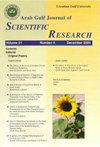Evaluating the compliance of environmental management systems: evidence from Moroccan banks
Q4 Business, Management and Accounting
引用次数: 0
Abstract
PurposeThe purpose of the study is to evaluate the compliance of environmental risk management systems implemented by Moroccan banks with ISO 14001 certification or environmental charters.Design/methodology/approachData were collected through the distribution of an environmental risk management questionnaire to all Moroccan banks’ branches, business centers and various central entities. The study uses regression analysis to model the relationship between environmental management system (EMS) compliance and environmental management explanatory variables to identify the most relevant indicators that can explain the effectiveness and reliability of an EMS.FindingsEmpirical evidence reveals that the evaluation of EMS compliance in Moroccan banks should consider two categories of variables: the first category is related to the culture of environmental risk management, and the second one is related to environmental management practices.Originality/valueThe results show that the “information” variables play a key role in the overall design of an EMS and represent essential variables in the general definition of the environmental policy and in raising awareness and providing information on the bank’s commitment to a pro-environmental approach. The “application” variables confirm that environmental management practices need to be put in place to manage the different environmental risks. The study raises some managerial implications and further research directions.评估环境管理系统的合规性:来自摩洛哥银行的证据
目的本研究的目的是评估摩洛哥银行实施的环境风险管理体系是否符合ISO 14001认证或环境宪章。设计/方法/方法通过向摩洛哥所有银行的分行、商业中心和各种中央实体分发环境风险管理问卷收集数据。本研究采用回归分析方法建立环境管理体系(EMS)符合性与环境管理解释变量之间的关系模型,以确定最相关的指标,可以解释环境管理体系的有效性和可靠性。实证证据表明,摩洛哥银行环境管理体系合规性评价应考虑两类变量:第一类与环境风险管理文化有关,第二类与环境管理实践有关。独创性/价值研究结果表明,“信息”变量在环境管理体系的总体设计中起着关键作用,代表了环境政策总体定义中的基本变量,并在提高认识和提供有关银行对亲环境方法承诺的信息方面发挥了重要作用。“应用”变量确认需要实施环境管理实践来管理不同的环境风险。本研究提出了一些管理启示和进一步的研究方向。
本文章由计算机程序翻译,如有差异,请以英文原文为准。
求助全文
约1分钟内获得全文
求助全文
来源期刊

Arab Gulf Journal of Scientific Research
综合性期刊-综合性期刊
CiteScore
1.00
自引率
0.00%
发文量
0
审稿时长
>12 weeks
期刊介绍:
Information not localized
 求助内容:
求助内容: 应助结果提醒方式:
应助结果提醒方式:


